Sorted by date Results 51 - 75 of 156
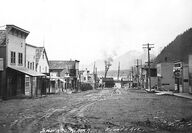
In March, Alaskans celebrate Seward's Day in honor of the man who succeeded in persuading the United States to buy Alaska from the Russians. And there are many landmarks named after President Lincoln's Secretary of State William Henry Seward. However, when Seward was chosen for the name of the town on Resurrection Bay, it took the personal intervention of President Theodore "Teddy" Roosevelt to make it possible. By 1902, John Ballaine, originator and promoter of the Alaska Central Railway and...

As a young man, famous American novelist Rex Ellingwood Beach struck out from Illinois in 1897 in search of his fortune in the gold-filled Klondike. Along with others who had some money and time, he chose to travel the all-water route. Hopeful prospectors like Beach hopped onboard steamships leaving Seattle and other West Coast ports bound for St. Michael, where they connected with flat-bottom sternwheelers for the 1,500-mile trip up the Yukon River to Dawson. However, many travelers discovered...
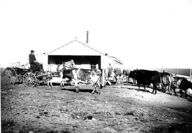
Fired with the romance of the undertaking and inspired by exciting rumors, thousands thronged to Nome's beaches in 1900 after gold nuggets were found in the sand. Lured by the siren's cry of "gold," prospectors who'd not had luck elsewhere in Alaska came in the hopes that Nome's sand would become their pay dirt. But several adventurers, like A.F. Raynor, swarmed to the Seward Peninsula to mine the gold-mad prospectors. Raynor, a port steward for the Blue Star Navigation Co., was working in...
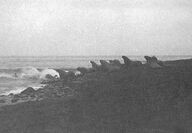
Capt. James Cook reported seeing a tall, sail-like rock about 60 miles west of Dutch Harbor in 1778. Unbeknownst to him and his crew, a 6,000-foot volcano lay beneath the conical mountain and its crater sat just below sea level. At various times throughout Alaska's history, navigators' logs recorded changes in the volcanic island's shoreline from season to season. Sometimes it was said to have disappeared into the ocean, only to emerge later in other locations. The mystery island, named...

Anchorage's first mayor, elected on Nov. 29, 1920, bore the responsibility of governing a railroad town of 1,856 people after five years of Alaska Engineering Commission management ended. When Judge Leopold David became Anchorage's mayor, he helped the new city council develop ordinances to provide law and order. They included establishing a 9 p.m. to 5 a.m. curfew for youth under 16, setting a speed limit of eight miles per hour in town and outlawing spitting in public places. David, an...
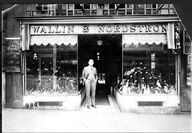
One of Anchorage's now-closed department stores can trace its roots to the Gold Rush days of the Klondike when a young Swede hunkered down with pick and ax and chipped out a small fortune. John W. Nordstrom arrived in New York City from his native Sweden in 1887. With $5 in his pocket, and not a lick of English on his tongue, the 16-year-old made his way to Michigan where he labored in an iron mine. He eventually migrated to the West Coast. While making $1.50 a day as a logger and sawmill hand...
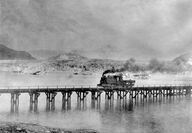
Prospectors searching for gold in the Wrangell mountains during the early 1900s found a mountain of copper instead. That discovery brought the famous Guggenheim-Morgan Syndicate into the history of Alaska, along with chicanery of the highest order. The Syndicate, which owned the copper mines, needed a transportation system to haul its lucrative cargo. It planned a railroad line in the Copper River valley that ran 196 miles from Cordova to the site of what became the Kennecott Copper mines. The...
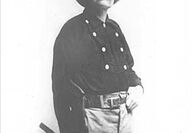
George Washington Carmack and his two inseparable friends, "Skookum" Jim Mason and Tagish Charlie, had wandered up and down the Yukon for several years before their gold discovery electrified the world in August 1896. Carmack traveled over glaciers, through marshes, among forests, lakes, rivers and mountains in search of his destiny. He seemed a misfit in a land where every man was looking for gold. He only wanted to live like the Natives among whom he'd made his home since coming north in...

Hair-raising experiences, hardships and back-breaking toil were common to the lives of those who struggled to take from Nature her wealth of precious minerals. Few emerged victorious, thousands failed. But the lure of gold continued to draw prospectors on to new fields in the 1930s. Prospectors did not work alone. Many relied on horses to help them mine claims along the rivers, beaches and mountains of the North, according to an article written by F.W. Gabler titled "Horse Power for Unuk Gold,"...
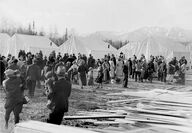
Long before the Matanuska Valley became one of the fastest-growing communities in the nation, Russians tried to establish agricultural settlements on its fertile soil. They taught the Dena'ina how to grow crops like potatoes, carrots, radishes and turnips. In 1844, Russians founded settlements at Matanuska and Knik, as well as Kachemak, Kasilof and Kenai. Russian Alexander Herzen wrote in 1859: "A handful of Cossacks and a few hundred homeless mujiks (peasants) crossed oceans of ice at their...
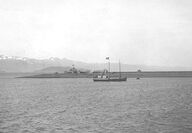
When news reached Seattle of gold discoveries in Cook Inlet in 1896, every available vessel was pressed into service. With ships scarce, those heading north were filled to capacity with prospectors and their supplies. And Capt. Johnny O'Brien's steamship Utopia, which set out with100 passengers that spring, was no different. In early May, it arrived close to Kachemak Bay, but couldn't continue on up Turnagain Arm because of ice in Cook Inlet. Although this turn of events didn't really bother...
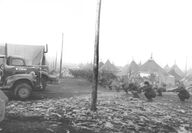
Six years before World War II broke out, Anthony J. Dimond, Alaska's delegate to Congress, started asking for military planes, airfields, army garrisons and a highway to link the Lower 48 to Alaska. When the war actually began in September 1939, rumors ran rampant around Anchorage that his pleas had been heard and military bases soon would be built to protect the northern front. Congress finally appropriated funds for Alaska in 1940, and the military started making plans for the construction of...
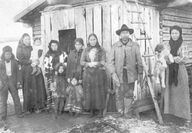
In the Koyukuk country, two rivers and a lake are named after a grizzled old Scottish prospector who explored the Copper River Valley. Not much is known of John Bremner's life before he arrived in the North Country, but his death triggered a very exciting chapter in Alaska's history. The hijacking of a Yukon River steamer, a wild chase on the Koyukuk, a miners' trial and frontier justice for Bremner's murderer make a story that could have been written by Rex Beach or Jack London. His stay at...
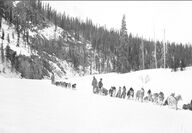
A few years before Lady Luck showered riches on Clarence Berry, the "luckiest man in the Klondike" didn't have enough money to pay his room rent. Caught in the panic of 1893, he was broke. He couldn't ask his sweetheart, Ethel Bush, to marry him and saw no particular prospect of ever being able to do so. In the Fresno Valley of California, where Berry raised fruit, he seemed destined to a lifetime of hard, plodding work for a bare living. So when he heard of riches to be dug out of the earth in...

It was a cold, snowy, windy January day in 1909 when a short, slightly built 22-year-old disembarked from the Yakutan in Prince William Sound. Eustace Paul Ziegler arrived in the boom town of Cordova to take charge of the Episcopal mission. Fresh from the Yale School of Fine Arts, he must have been a shock to the thousands of roughly dressed pick-and-shovel "stiffs," lumberjacks, miners, engineers, dynamiters, surveyors, adventurers and what-not who had "floated in with the tides and the ties"...
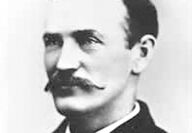
Alaska's first law officer in the Interior knew a thing or two about the criminal element. Frank Canton, appointed deputy marshal for Circle in winter 1898, had served with distinction as a peace officer in Wyoming and Oklahoma Territory. He'd also escaped from prison while serving time for bank robbery, murder and holding up a stagecoach in Texas. The sketchy lawman's reputation as a range detective in Wyoming, notably as a killer for ambushing rustlers, secured his appointment in Alaska...

Technically speaking, Anchorage was born in November 1920. According to information gleaned by the League of Women Voters many years ago, it was eligible to become a first-class city because it had a population in excess of 400 – provided that two-thirds of the voters were ready to assume responsibilities of city government for its 2,500 residents. A group of interested citizens filed a petition with the U.S. District Court at Valdez, which was the headquarters of the Third Judicial Division. T...

Alaska's governor from 1933 to 1939 believed that more people and more roads would help the territory achieve statehood. And John Weir Troy, who came to Alaska during the gold rush in 1897, thought a larger population and a better road system would help achieve that goal. "More people for Alaska is her greatest need," said the former pack-train worker. "But they won't come, and we could not take care of them if they did, until we have roads to take them to the valleys, hills and mountains where...
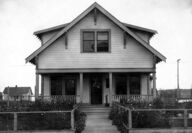
Criminals dabbling in everything from prostitution to bootlegging to gambling flourished in the Alaska territory during the late 1800s and early 1900s. Believing that gold miners and other citizens easily could be parted from their hard-earned income, thugs crossed the border into Alaska when law enforcement in the rest of the United States cracked down on their criminal enterprises. A January 1921 newspaper article from Juneau captured the flavor of the situation: "In anticipation of an influx...
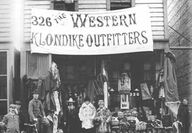
Glowing reports, like the following excerpt from the Aug. 8, 1897, edition of the New York World newspaper, helped fuel the stampede for gold along the Yukon River. "Mr. J. O. Hestwod, one of the most successful argonauts of '97, has just returned from Klondike and furnishes by telegraph to the Sunday World a true picture of Alaska as it really is. He said: 'Modern or ancient history records nothing so rich in extent as the recent discoveries of gold on the tributaries of the Yukon River. 'The...
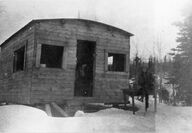
When the U. S. Army took over responsibility for administering Alaska in 1867, law enforcement found it had its hands full trying to stem the flow of liquor into the territory. Up until alcohol possession was legalized in 1899, smugglers brought their illegal brew into Alaska via whalers, fishing vessels, American and foreign ships and Indian canoes from both British Columbia and U.S. ports. Enforcement also had problems controlling the manufacture of "hootch," a name taken from the Tlingit...

The remote islands of the Aleutian Chain, home to the Unangan people for more than 8,000 years, endured the first invasion on American soil since the War of 1812. On June 6, 1942, at around 10:30 p.m., 500 Japanese troops came ashore at Kiska. They captured a small American naval weather detachment of 10 men, along with a dog. One member of the detachment escaped, but surrendered after 50 days – thin, starving and cold. The enemy then invaded Attu at 3 a.m. on June 7. Villagers, who'd been e...
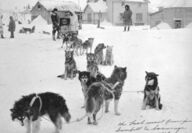
The establishment of airplane competition didn't stop Chester Noongwook of St. Lawrence Island from continuing his dog sled mail service run until 1963. His was the last mail delivery of its kind in the country. Wien Airlines established the first commercial airplane base on St. Lawrence Island at Gambell and built a landing strip at Savoonga. The company took over the mail-carrying duties for the U.S. Post Office. But Noongwook was retrained on a supplemental basis whenever the planes couldn't...

Movies about Alaska, mostly based on books by Jack London and Rex Beach, thrilled audiences during the early 1900s. But all motion pictures were filmed outside of Alaska. So when a group of Oregon promoters planning a travelogue and feature film about the territory toured Alaska's towns in 1922, several Anchorage residents decided to go into the filmmaking business themselves. They formed the Alaska Motion Picture Corp. and elected Austin E. "Cap" Lathrop, who owned theaters in Anchorage,...
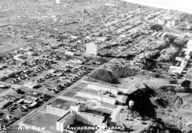
By the early 1950s, the tent city at the mouth of Ship Creek had turned into a bustling, modern city. Clifford Cernick wrote that Anchorage was much like Baghdad in an article that appeared in the Seattle Times on March 4, 1951 – a time when Baghdad was a bustling city, a jewel in the desert. "A grizzled prospector, back in Anchorage after three years in the Alaskan wilderness, noted the towering framework of a new apartment building, the paved streets, the bustling downtown traffic and g...